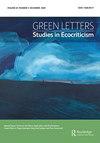莎士比亚和人类环境的进化:适应,解释,变异
Q1 Arts and Humanities
引用次数: 0
摘要
这个理论和叙事的工作汇集了生态批评,生物仿生学和莎士比亚的不同领域,以一种发人深省和原创的方式构建了叙事的本质是生活本身的论点。戴为自然环境、人体和文学之间的联系提供了一个新的视角,他把文本看作是在一个进化系统中运作的有机体,这个进化系统产生于我们的物质世界,并与我们的物质世界平行。戴伊认为,在相互关联的系统中,信息会随着时间和空间的变化而适应和变异,以不可预测的方式塑造未来。这一思想在每一章中都通过对莎士比亚戏剧和一部与早期戏剧有遗传关系的现代作品的考察来说明。戴之所以选择把重点放在莎士比亚身上,是因为他的作品在我们的文化中特别有影响力,而且无处不在,尽管戴指出,莎士比亚的故事可以追溯到最早的文明。这些例子强调了文学在思想传播和人类世界构建中的重要性,“人类世界”是德国生物学家雅各布·冯·uexk本文章由计算机程序翻译,如有差异,请以英文原文为准。
Shakespeare and the evolution of the human umwelt: adapt, interpret, mutate
This theoretical and narrative work brings together the diverse fields of ecocriticism, biose-miotics and Shakespeare in a thought-provoking and original way to construct the argument that the nature of narrative is life itself. Day offers a new perspective on the connections between the natural environment, human bodies and literature, viewing texts as organisms that operate within an evolutionary system that emerges from, and runs parallel to, our material world. Day argues that information in interrelated systems adapts and mutates as it travels through time and space, shaping the future in unpredictable ways. This idea is illustrated in each chapter through an examination of a Shakespeare play and a modern work that is genetically related to the earlier drama. Day chooses to focus on Shakespeare because his works are particularly influential and ubiquitous in our culture, although Day points out that their stories can be traced back to the earliest civilisations. These examples underline the importance of literature’s role in the transmission of ideas and the construction of the human umwelt , a term coined by the German biologist Jakob Von Uexküll to denote ‘the species-specific linguistic habitat that humans share in common’ (xxii). In each chapter, Day builds on the theories of scientists and literary critics, and he inter-sperses the narrative in this often personal work with engaging stories from his own life that support his argument. Day hopes that his insights into our deep connection to the natural world will encourage humanity to disregard arbitrary barriers between species and see the world from an evolutionary perspective. In this way, the author aims to foster a greater respect for nature and a heightened awareness of the cascading effects our actions can have on the environment. This is very much a book for our times as the world continues to grapple with Covid and global warming. living love
求助全文
通过发布文献求助,成功后即可免费获取论文全文。
去求助
来源期刊

Green Letters
Arts and Humanities-Literature and Literary Theory
CiteScore
0.50
自引率
0.00%
发文量
38
期刊介绍:
Green Letters: Studies in Ecocriticism explores the relationship between literary, artistic and popular culture and the various conceptions of the environment articulated by scientific ecology, philosophy, sociology and literary and cultural theory. We publish academic articles that seek to illuminate divergences and convergences among representations and rhetorics of nature – understood as potentially including wild, rural, urban and virtual spaces – within the context of global environmental crisis.
 求助内容:
求助内容: 应助结果提醒方式:
应助结果提醒方式:


